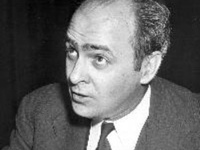As the congressional focus on combatting communism in universities crescendoed, Harvard students, faculty members and administrators were increasingly forced to decide where their loyalties would fall.
Washington Targets Harvard
That spring, the mounting pressure on academic institutions to root out communists in their ranks came to a head at Harvard, when three members of the Harvard faculty became targets of a McCarthyist investigation.
In February and again in April, Congress demanded that Associate Professor of Physics Wendell H. Furry appear before Velde’s committee to face questions about his ties to the Communist Party during his time as a research associate at MIT.
Furry denied that he was currently a communist, but when pressed about his past associations, invoked his Fifth Amendment rights to withold information.
The other two faculty members, Assistant Professor of Anatomy Helen Deane Markham and Social Relations teaching fellow Leon Kamin, maintained similar silence under congressional scrutiny.
Facing pressure from Washington, the Corporation decided to review the employment of the three faculty members in light of their unwillingness to answer all questions in the national inquiry.
At other universities, taking the Fifth was considered an admission of guilt and grounds for dismissal, and earlier in February, Conant had indicated that Harvard would follow a similar policy.
But the Corporation’s final decision did not uphold this stance.
In a move that shocked and affronted ardent anti-communists, the Corporation announced on May 19 that it would retain all three members on the Faculty. Furry and Kamin, their report concluded, were no longer members of the Communist Party; Markham had never been a member.
While the Corporation reprimanded Furry and Kamin for their past communist associations and condemned the invocation of the Fifth, they allowed the three faculty members to keep their positions at Harvard, a move that most of their Harvard colleagues applauded.
“Virtually every professor contacted yesterday called the decision ‘courageous’ and ‘wise,’” The Crimson reported on May 22.
Activities, Not Activism
While the shadow of McCarthyism hung over the entire University and members of the Class of 1953 say they were aware of the suspicions surrounding several faculty members, there was more discussion than political activism among students at the time.
“There was constant discussion of the degree to which professors might or might not be sympathizers,” says Greeley. “There were a lot of professors who were very, very liberal but certainly not communists, yet at the time there was the danger of classing them a little bit on the pink side.”
Read more in News
Sikh’s Sword Seized By School













